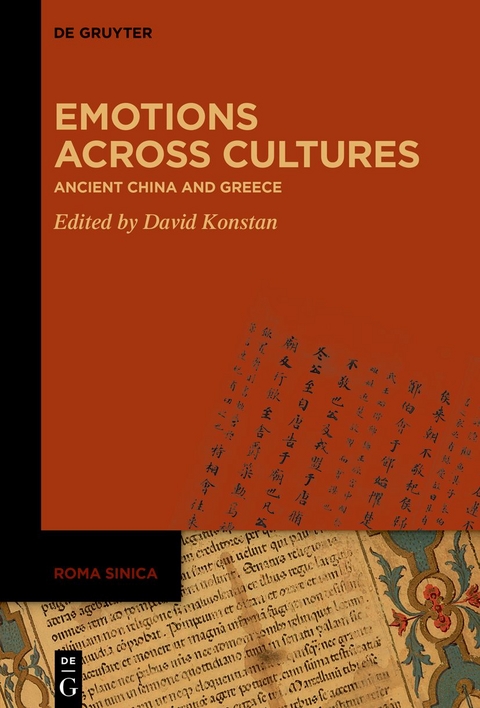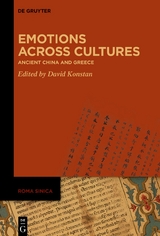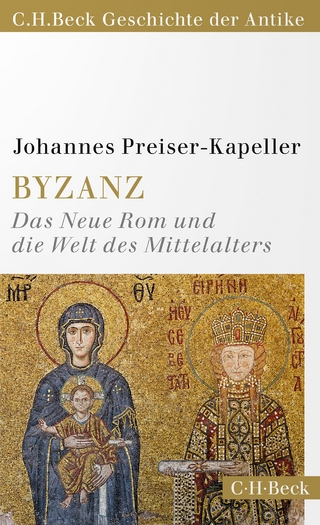Emotions across Cultures
Ancient China and Greece
Seiten
2022
De Gruyter (Verlag)
978-3-11-077990-5 (ISBN)
De Gruyter (Verlag)
978-3-11-077990-5 (ISBN)
Roma Sinica. Mutual interactions between Ancient Roman and Eastern Thought is an original series in classical and comparative studies. Generously supported by the SIAC (International Society of Cicero’s friends), it aims to publish works concerning the relationships between Ancient Western (Greek, Roman) and Eastern (Korean, Chinese, Japanese) thought.
It is now recognized that emotions have a history. In this book, eleven scholars examine a variety of emotions in ancient China and classical Greece, in their historical and social context. A general introduction presents the major issues in the analysis of emotions across cultures and over time in a given tradition. Subsequent chapters consider how specific emotions evolve and change. For example, whereas for early Chinese thinkers, worry was a moral defect, it was later celebrated as a sign that one took responsibility for things. In ancient Greece, hope did not always focus on a positive outcome, and in this respect differed from what we call “hope.” Daring not to do, or “undaring,” was itself an emotional value in early China. While Aristotle regarded the inability to feel anger as servile, the Roman Stoic Seneca rejected anger entirely. Hatred and revenge were encouraged at one moment in China and repressed at another. Ancient Greek responses to tragedy do not map directly onto modern emotional registers, and yet are similar to classical Chinese and Indian descriptions. There are differences in the very way emotions are conceived. This book will speak to anyone interested in the many ways that human beings feel.
It is now recognized that emotions have a history. In this book, eleven scholars examine a variety of emotions in ancient China and classical Greece, in their historical and social context. A general introduction presents the major issues in the analysis of emotions across cultures and over time in a given tradition. Subsequent chapters consider how specific emotions evolve and change. For example, whereas for early Chinese thinkers, worry was a moral defect, it was later celebrated as a sign that one took responsibility for things. In ancient Greece, hope did not always focus on a positive outcome, and in this respect differed from what we call “hope.” Daring not to do, or “undaring,” was itself an emotional value in early China. While Aristotle regarded the inability to feel anger as servile, the Roman Stoic Seneca rejected anger entirely. Hatred and revenge were encouraged at one moment in China and repressed at another. Ancient Greek responses to tragedy do not map directly onto modern emotional registers, and yet are similar to classical Chinese and Indian descriptions. There are differences in the very way emotions are conceived. This book will speak to anyone interested in the many ways that human beings feel.
lt;strong>Davind Konstan, Department of Classics, New York University, USA.
| Erscheinungsdatum | 10.05.2022 |
|---|---|
| Reihe/Serie | Roma Sinica ; 3 |
| Zusatzinfo | 8 b/w and 2 col. ill., 2 b/w tbl. |
| Verlagsort | Berlin/Boston |
| Sprache | englisch |
| Maße | 155 x 230 mm |
| Gewicht | 616 g |
| Themenwelt | Geschichte ► Allgemeine Geschichte ► Altertum / Antike |
| Geisteswissenschaften ► Sprach- / Literaturwissenschaft ► Literaturwissenschaft | |
| Schlagworte | Antike • Antiquity • China • Emotion • Emotions • Greece • Griechenland |
| ISBN-10 | 3-11-077990-0 / 3110779900 |
| ISBN-13 | 978-3-11-077990-5 / 9783110779905 |
| Zustand | Neuware |
| Informationen gemäß Produktsicherheitsverordnung (GPSR) | |
| Haben Sie eine Frage zum Produkt? |
Mehr entdecken
aus dem Bereich
aus dem Bereich




